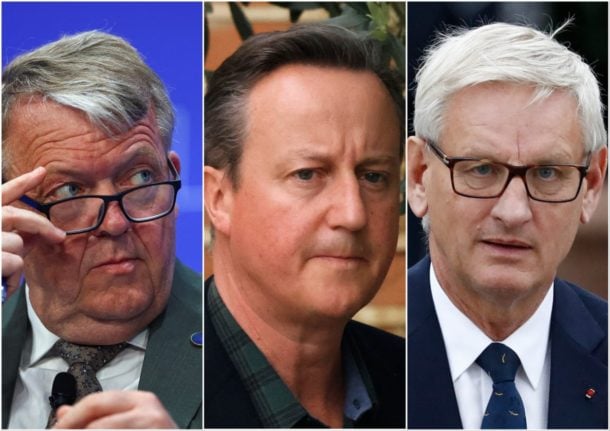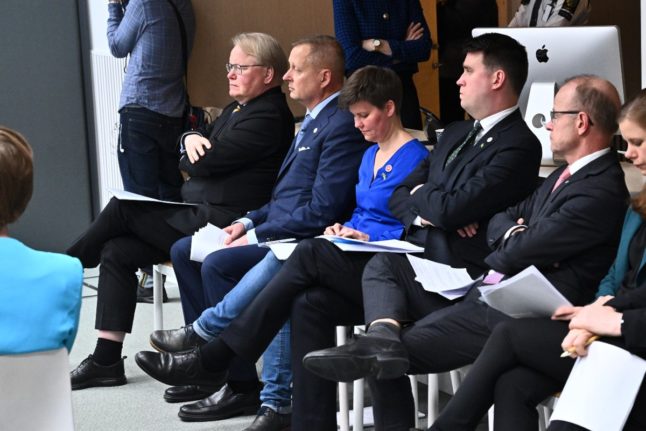Rasmussen, who served two terms as Denmark’s prime minister, from 2009 to 2011 and again from 2015 to 2019, was appointed foreign minister last December by the Social Democrat prime minister who had ousted him nearly four years earlier.
Bildt had to wait longer. After serving as prime minister between 1991 and 1994, he was appointed foreign minister twelve years later in 2006, staying in the post two full terms until 2014.
Never one to miss an opportunity to draw attention to himself on X, Bildt on Monday welcomed Cameron to the “rather distinguished club of former PM’s becoming Foreign Minister”.
Here’s what Cameron can learn from Rasmussen and Bildt’s records.
1. Your failures as PM need not get in the way
Neither has anything on the record quite as dramatic as Cameron’s decision to call and subsequent get defeated in the Brexit referendum. Their experiences do, however, show that what you did as PM need not matter that much.
Bildt’s term was rocky, to say the least, with Sweden’s Riksbank – then not wholly independent of government – in 1992 forced to raise interest rates to a hair-raising 500 percent to defend the krona. His government also brought in the liberal system of for-profit, government-funded free schools which some see as to blame for a sharp drop in the performance of Sweden’s schools.
“People remember him for being a really strong political leader when it comes to foreign policy, not for being a strong prime minister,” said Jenny Madestam, Associate Professor in Politics at Stockholm’s Södertörn University, although she said he was nonetheless “an iconic leader” in Sweden’s Moderate Party.
A key difference from Cameron, of course, is that Bildt’s government oversaw the referendum that brought his country into the EU, and not one that saw it leave.
Løkke Rasmussen, on the other hand, led a government that shocked many internationally with its hardline response to the 2015 refugee crisis, at one point passing a law allowing asylum seekers to be stripped of jewellery to pay for their accommodation.
In neither case has their record been a hindrance to their performances as foreign minister, with Rasmussen much softer on immigration and immigrants than he was as prime minister, helping, for instance, to draw up a ban on Quran-burning.
2. Being patrician and aristocratic works well internationally
With his Eton education, stockbroker father and baronet grandfather, David Cameron is sometimes criticised for his privilege. But Bildt is, if anything, even more aristocratic, coming from a long line of Danish-Swedish nobles and boasting a general as a grandfather and a 19th century prime minister as a great great grandfather.
But while this sort of background can be a disadvantage when trying to engage with voters, it’s a good preparation for the flurry of international summits, dinners, and embassy events that come with being foreign minister – as evidenced by the concentration of nobility within Sweden’s foreign ministry.
Bildt was so in his element as foreign minister that he has carried on jetting around the world meeting international leaders, both as a consultant and on any number of short-term assignments, for most of the ten years since he left the post.
Rasmussen, however, has a lower middle class background, being the first in his family to go to university.
3. You can bring some of your prime ministerial status to your role as foreign minister
Whether it’s a summit of the European Union, the United Nations, or of Nato, prime ministers often take over from their foreign ministers when it comes to crunch decisions. Rasmussen met Benjamin Netanyahu countless times in his role as prime minister, something he has been able to exploit as foreign minister during the Israel-Gaza crisis.
“It has been a strength for Rasmussen to have been prime minister because he has a lot of contacts,” Peter Nedergaard, a politics professor at Copenhagen University, told The Local. “He can easily pick up the phone and call heads of states around the world, and the same goes for David Cameron.”
Bildt as foreign minister brought with him the heft he had gained, not only from his term as prime minister, but from his positions as the EU’s Special Envoy to Former Yugoslavia, High Representative for Bosnia and Herzegovina, and the UN Secretary General’s Special Envoy for the Balkans.
This is where Cameron differs.
“David Cameron has been out of politics for now almost four or five years, whereas Lars Løkke Rasmussen was always in politics,” Nedergaard pointed out. “He was a member of parliament all the time. So there’s no gap for him. David Cameron has been out of sight for a long time.”
4. It’s quite easy to stay out of the current PM’s way
Foreign Minister is the ministerial role where it’s easiest to stay out of the prime minister’s way. Rasmussen has rarely clashed with Denmark’s prime minister, Mette Frederiksen, even though he was her main opponenent in the 2019 election.
Similarly, Barack Obama appointed Hillary Clinton, his rival in the 2008 Democrat primary, Secretary of State, on taking office.
Rasmussen has handled this very carefully, Nedergaard explained.
“His approach is to be very humble vis-à-vis the prime minister, always showing that he’s not the number one any more. Often, he says, ‘this is not my decision’, so attitude is very important.”
Similarly, Bildt managed to carry out his role without much friction with Fredrik Reinfeldt, even though Reinfeldt had taken the Moderate Party to the centre of Swedish politics, abandoning much of the liberal economic programme Bildt had fought for.
“He had he had a low profile in the in the government as a whole,” Madestam said. “He was really focused on the foreign policy, and everyone knows that that is his first and foremost interest and also what he’s really good at.”



 Please whitelist us to continue reading.
Please whitelist us to continue reading.
Member comments